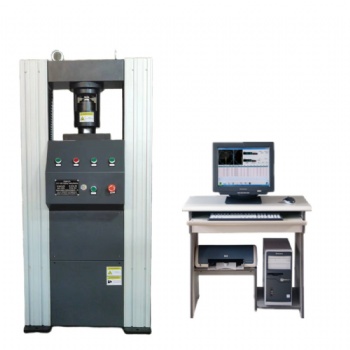News
the Benefits of a 1 Ton Tensile Strength Testing System for Small-Scale and Industrial Applications
the Benefits of a 1 Ton Tensile Strength Testing System for Small-Scale and Industrial Applications
In industries where material strength and quality are critical, a tensile strength testing system is essential. A 1 ton tensile strength testing system offers a versatile solution for manufacturers, researchers, and quality control teams, providing an efficient way to test smaller samples or materials with moderate strength requirements. In this blog, we’ll look at the applications, benefits, and considerations of a 1 ton tensile strength testing system and why it’s an ideal choice for many businesses.
What is a 1 Ton Tensile Strength Testing System?
A 1 ton tensile strength testing system is a compact yet robust testing machine designed to measure the tensile (pulling) strength of materials up to a maximum load of 1 ton (or approximately 1,000 kg). This capacity makes it suitable for materials with moderate strength, such as polymers, textiles, thin metals, and composites, allowing users to evaluate a material's ability to withstand tensile stress and its general mechanical properties.
Applications of a 1 Ton Tensile Strength Testing System
A 1 ton tensile strength testing system is popular in industries that regularly test medium-strength materials or require testing for smaller specimens. Key applications include:
Plastics and Polymers: These materials often require tensile testing to ensure durability, flexibility, and reliability. A 1 ton system is generally sufficient to measure the tensile strength and elasticity of various plastics.
Textiles and Fabrics: In the textile industry, tensile testing verifies the strength and elongation properties of fibers and fabrics, ensuring product durability and quality.
Biomedical Materials: Testing is essential for materials used in medical devices or implants, such as biocompatible polymers, where mechanical performance is crucial for patient safety.
Electronics and Consumer Goods: Small-scale metal and plastic components used in electronics need testing to confirm their strength and longevity, especially under frequent or repetitive use.
Research and Development (R&D): This system is also widely used in laboratories and research facilities where testing of prototypes, samples, and experimental materials is essential for innovation.
Key Benefits of Using a 1 Ton Tensile Strength Testing System
1. Precision and Accuracy
The 1 ton tensile strength testing system is equipped with high-precision load cells and software that provide accurate, repeatable measurements. Whether you’re testing for tensile strength, elongation, or yield strength, these systems ensure that each result is reliable, critical for both research and quality control.
2. Compact and Efficient Design
Compared to high-capacity tensile testers, a 1 ton system is typically compact and easier to operate. Its smaller footprint makes it ideal for laboratories or facilities with limited space, without compromising on essential functionality. The system’s compact design also means it can often be operated by a single user, making testing faster and more efficient.
3. Cost-Effective Solution
For businesses that don’t need heavy-duty testing machines, a 1 ton tensile strength system offers a cost-effective solution. These systems generally cost less than high-capacity machines, and their lower power requirements reduce operating costs. This combination of affordability and efficiency makes it a smart investment for small and medium-sized companies.
4. Versatile Testing Capabilities
Although limited to a 1-ton capacity, this tensile testing system can perform a range of test types. In addition to standard tensile testing, many models offer compression, flexure, and shear testing options, making them suitable for a wide array of materials and testing requirements. This versatility allows users to conduct multiple types of tests with a single machine, maximizing utility.
5. Compliance with Industry Standards
Most 1 ton tensile testing systems are designed to meet international testing standards, including ASTM, ISO, and EN standards. This compliance ensures that test results meet regulatory requirements and can be confidently used for quality control and certification purposes, which is particularly important for industries with stringent compliance needs.
How to Choose the Right 1 Ton Tensile Strength Testing System
When selecting a 1 ton tensile strength testing system, consider the following factors to ensure it meets your needs:
Testing Requirements: Identify the types of tests your application requires, such as tensile, compression, or flexure tests, to ensure the system offers relevant capabilities.
Material Compatibility: Evaluate the types of materials you’ll be testing to make sure the machine is suitable. For example, textiles and polymers may require specific grips or fixtures.
Software and Data Analysis: Look for a system with advanced software features for data collection, analysis, and export. This functionality can help you manage results effectively and streamline your quality control process.
Ease of Use and Maintenance: Systems with intuitive interfaces, digital displays, and minimal maintenance requirements will save time and reduce training needs, especially valuable for companies with limited technical staff.
Compliance with Standards: Ensure the system meets relevant standards for your industry. Compliance with ASTM, ISO, or EN standards can be crucial, especially for regulated industries.
Maintenance Tips for 1 Ton Tensile Strength Testing Systems
To keep your tensile strength testing system operating smoothly and prolong its lifespan, follow these maintenance tips:
Regular Calibration: Schedule routine calibrations to ensure the system maintains its accuracy, especially if it's used frequently. Many testing standards require regular calibration for compliance.
Inspect Fixtures and Grips: Check grips and fixtures for wear, as these components directly interact with the test specimens. Worn grips can impact testing accuracy and damage samples.
Clean the Machine Regularly: Keep the machine clean and free from dust and debris. Cleaning is particularly important for sensors and load cells to maintain accuracy.
Follow Manufacturer Guidelines: Adhere to the manufacturer’s instructions for operating and maintaining the machine. Regularly updating software and firmware can also improve performance and add new features.
Conclusion
A 1 ton tensile strength testing system is an invaluable tool for industries that require accurate, reliable material testing on a smaller scale. Whether in the R&D lab, production floor, or quality control department, this system’s precision, compact design, and versatility make it a great fit for various applications. For businesses seeking a cost-effective and efficient solution to test the mechanical properties of medium-strength materials, a 1 ton tensile strength testing system offers the performance and reliability needed to meet today's industry standards.
By investing in a high-quality tensile testing system, businesses can ensure their materials meet quality benchmarks, support safety requirements, and contribute to product excellence, helping them gain a competitive edge in the marketplace.
bally leather flexibility testing machine, taber abrasion tester, cable connectors tensile testing machine, safety shoe impact resistance tester
Categories
Contact Us
- +86-18615632092
- wtbequipment@hotmail.com
- sophie-tester
- +86-18615632092




 售前客服
售前客服